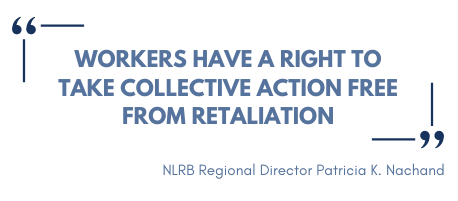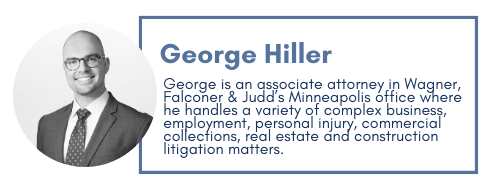Perspectives
The NLRB has Teeth!
That’s right. You heard us. The National Labor Relations Board (NLRB) is not the toothless, independent federal agency some would have you believe.

In March of this year, Region 25 of the NLRB secured an agreement settling a case against a Midwest employer, Hilst Enterprises, Inc. d/b/a La-Z-Boy Furniture Galleries (Hilst), for $297,000 in backpay, front, pay, interest, excess tax, mileage, and medical expenses for the two discharged employees; removal of the unlawful discharges from the employee’s files; and a letter of apology to the discharged employees with mail and email notices to its current employees.
So, what exactly happened with Hilst? Essentially, it boils down to two key issues.
First, Hilst maintained three unlawful work rules:
- Forbidding employees from discussing wages
- Imposing restrictions on employees’ use of its name and logo without explicit permission.
- Prohibiting employees’ personal use of the company email system and equipment
Additionally, two employees were fired the day after they engaged in protected concerted activity by expressing concerns about the behavior of Hilst’s President and its potential effect on Hilst’s employees and business.
As you probably know, Section 7 of the NLRA guarantees certain rights for workers. These include “the right to self-organization, to form, join, or assist labor organizations, to bargain collectively through representative of their own choosing, and to engage in other concerted activities for the purpose of collective bargaining or other mutual aid or protection,” as well as the right to “refrain from any or all such activities.” Section 8(a)(1) of the NLRA makes it an unfair labor practice for an employer to “interfere with, restrain, or coerce employees in the exercise of the rights guaranteed in Section 7.”

In the present case, the Court concluded that “it is axiomatic that employees have a Section 7 right to discuss their wages” and observed that the three rules stated above could reasonably be construed by an employee to restrict or prohibit Section 7 activities. The Court also found “that the employee complaints about changes made by management to their working conditions constituted protected concerted activity” and that Hilst’s discharge of the two employees was intended to punish their protected conduct.

The crucial insights from this case abound. Employers need to regularly reassess their policies to ensure they are not chilling the rights of their workers under the NLRA. Employers must be aware that, in the words of NLRB Regional Director Patricia K. Nachand, “Workers have a right to take collective action free from retaliation.”
The NLRB laws serve as a crucial safeguard for employee’s rights to organize and collectively bargain. Employers who fail to uphold these rights not only risk legal penalties, but also undermine trust , morale, and productivity within their organizations. It’s essential for employers to prioritize compliance with these laws, not only to avoid financial and legal repercussions but also foster a fair and respectful workplace environment where both employees and employers can thrive together. Upholding these rights is not just a legal obligation but a cornerstone of an equitable workplace.
Being mindful of the language in your employee handbooks, contracts and agreements is solid first step in proactively protecting your business from legal risk. Consulting with an Employment Law Attorney while creating and updating your documents is a simple way to ensure compliance with your local and federal laws. Learn more about the Business Support Services provided by Wagner, Falconer & Judd here.
